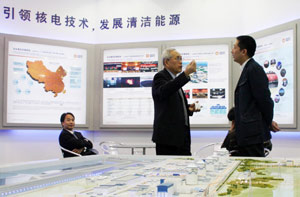Currency measure prompts warnings from US officials
Updated: 2011-10-27 10:45
By Tan Yingzi (China Daily)
|
|||||||||||
WASHINGTON - United States government officials expressed reservations on Tuesday about a currency bill aimed at China, which the Senate passed two weeks ago.
The House Ways and Means Committee examined trade ties with China on Tuesday before the chamber considers bringing the bill to the floor for a vote.
The Senate passed the legislation earlier this month, leaving the thorny issue in the hands of the House of Representatives and the Barack Obama administration.
The Currency Exchange Rate Oversight Act would allow sanctions against China if the US Treasury Department finds China is manipulating its currency, the yuan.
At the request of a US company, the Commerce Department would investigate whether a foreign government is subsidizing its companies by deliberately undervaluing its currency and calculate duties on its imports accordingly.
"Some in Congress focus on legislation to address currency manipulation as if it were a silver bullet," the committee's chairman Dave Camp said in his opening remarks.
"In doing so, they miss the many issues we have with China."
Lael Brainard, the Treasury Department's undersecretary for international affairs and one of the two Obama administration officials present at the hearing, said the administration supports the goals of the Chinese currency bill. However, Brainard added, some aspects of the legislation might not be in compliance with international trade laws.
"Aspects of pending legislation ... do raise concerns about consistency with our international obligations and we are discussing these issues with members (lawmakers)," she said.
She told the committee that China's currency should rise faster, though it has appreciated more than 7 percent in the past 15 months and 40 percent in the past five years.
"In real terms, considering the inflation rate, it has appreciated 10 percent" since last June, she said.
The other official who spoke at the hearing, Deputy US Trade Representative Demetrios Marantis, told the panel that despite some challenges in the bilateral trade relationship, China has become more and more important to US exporters and businesses.
"In fact, since 2001, our exports to China have been growing faster than to any other major market in the world," he said.
China is the third-largest export market for the US, with a total of $113 billion exports in 2010, according to the Office of the US Trade Representative.
Henry Paulson, former US treasury secretary, said on Tuesday that he did not think the currency bill was the right approach to address the issue.
"It's in China's best interest to reform and move to a market-determined currency that reflects economic conditions," he said after a speech on China-US economic relations at Johns Hopkins University in Washington.
"I don't believe that it's a right approach for one sovereign nation to essentially try to dictate to another and say, 'If you don't do this I'm going to threaten you with a punishment'. "
Though many Republicans joined the line in the Democratic-controlled Senate, the currency bill's prospects in the Republican-controlled House are uncertain.
Republican House Speaker John Boehner has called the bill "dangerous" and said it would trigger a trade war. He also suggested that he might not permit the legislation to be brought to a vote.
US President Barack Obama has also expressed concern over the bill, which might violate World Trade Organization rules.
A recent survey shows that the exchange rate doesn't affect the competitiveness of US companies in China, where they continued to experience healthy market growth. About 80 percent reported double-digit revenue growth in 2010.
The exchange rate issue ranks 26th, five spots lower than last year, according to the US-China Business Council annual member survey.
Top challenges among the companies surveyed include human resources, licensing barriers, restrictions on foreign ownership in many key industries, market access barriers for US service sector companies and intellectual property rights protection.
Eighty percent of 240 member companies surveyed said their operations in China saw double-digit growth, and more than 40 percent achieved profit growth of more than 20 percent, the US-based council said.
China's rapid economic ascent makes it an increasingly important market for US companies, even during the global downturn.
Lu Chang in Beijing contributed to this story.










